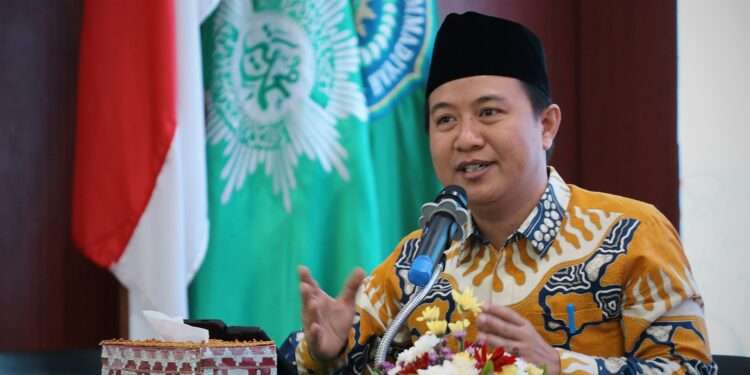MUHAMMADIYAH.OR.ID, YOGYAKARTA — General Treasurer of Muhammadiyah Hilman Latief stated that diaspora is more than just moving to a new place. It reflects the spirit of hijrah, a journey of change, resilience, and solidarity in pursuit of a greater purpose.
Hilman, who is also Indonesia’s Director General of Hajj and Umrah, also discussed the growing presence of Indonesians abroad and Muhammadiyah role in this global movement. Since the 20th century, millions of Indonesians have settled overseas, including Muhammadiyah members who pursue education and careers in various countries. Many of them have successfully established Muhammadiyah Special Branches (PCIMs) and developed Muhammadiyah enterprises.
Recognizing this potential, Muhammadiyah is now working on a structured diaspora strategy to expand its international reach.
“In the future, the diaspora concept will be integrated into Muhammadiyah. International expansion is a major goal, ensuring that Muhammadiyah grows globally while its members continue contributing to Indonesia,” said Hilman in the preaching conducted by the Muhammadiyah Provincial Board of Yogyakarta on Saturday, March 8.
However, diaspora is not only about going abroad. Hilman emphasized the importance of the domestic diaspora, referring to the placement of Muhammadiyah members in key sectors within Indonesia, including government and public service. This is seen as a crucial step in strengthening Muhammadiyah role in shaping the nation.
To achieve this, Hilman called for dedicated programs that support the strategic placement of Muhammadiyah members. He urged the Muhammadiyah Council for Cadre and Human Resources (MPKSDI) and the Muhammadiyah Department of Politics and Public Policy (LHKP) to actively develop both short-term and long-term diaspora initiatives.
Beyond placing members in strategic roles, Muhammadiyah should also ensure its cadres are prepared for challenges outside the organization.
“To be part of the diaspora, you need mental resilience. Muhammadiyah operates without external pressure, but outside, the challenges are much greater,” explained Hilman.
Haedar encouraged Muhammadiyah leaders to seek members who are confident, assertive, and capable of standing their ground.
“Many of our members tend to be too reserved when facing political and bureaucratic challenges. A strong mindset is essential for the diaspora. We need individuals who can communicate effectively, engage in discussions, and build strong networks. When working in the public sector, our policies should align with Muhammadiyah values while benefiting the wider community,” he added.
Hilman emphasized that diaspora is not just about positioning members in key roles but also about creating opportunities for movement and collaboration. This approach allows Muhammadiyah members to work across different fields and locations, helping spread Islam Berkemajuan (Progressive Islam).
“Building a strong and well-connected diaspora is crucial for Muhammadiyah future. Hopefully, our members will continue to align with national interests and contribute to a more progressive and interconnected society,” expressed Hilman.







